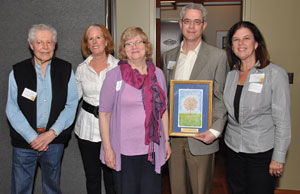 The Bushman Community Endowment program, begun in 2007 by the Jewish Community Foundation of Greater Kansas City, is celebrating its successes. BCE was established as a way to help local Jewish agencies and congregations learn ways to better cultivate planned giving, thus allowing them to build their endowments and keep their vital programs flourishing. It was originally slated to last three years, but the participating organizations were doing so well that Bushman and JCF committed to extend the program an additional two years. Now The Temple, Congregation B’nai Jehudah has completed all five of its fundraising goals in just four years. They are the first organization to accomplish all five annual goals.
The Bushman Community Endowment program, begun in 2007 by the Jewish Community Foundation of Greater Kansas City, is celebrating its successes. BCE was established as a way to help local Jewish agencies and congregations learn ways to better cultivate planned giving, thus allowing them to build their endowments and keep their vital programs flourishing. It was originally slated to last three years, but the participating organizations were doing so well that Bushman and JCF committed to extend the program an additional two years. Now The Temple, Congregation B’nai Jehudah has completed all five of its fundraising goals in just four years. They are the first organization to accomplish all five annual goals.
“The significance of B’nai Jehudah reaching its five-year goals in planned giving is immeasurable. Along with the BCE teams from other agencies and congregations, we can be assured that we will see security and stability in our Jewish community for years to come. Planned giving, though, is much more than a five-year program. It is just the beginning. It is our hope that everyone in our community will take the opportunity to leave a legacy,” noted Merilyn Berenbom, BCE’s chair.
BCE’s roots
BCE was founded with a grant from the Stanley J. Bushman Supporting Foundation. Since 2007 $800,000 has been invested in this signature JCF program. Diane Azorsky, assistant executive director and director of community endowments, said Bushman has invested this money in an effort “to train and motivate our organizations to secure their financial futures through planned giving.”
Since its inception, all of the participating organizations and synagogues have collectively raised an estimated $30 million from a total of 302 individual donors and families.
BCE participants were chosen by an application process. Each organization that was accepted put together teams of lay leaders and professionals who came to mandatory training sessions to learn about all the different components of a successful planned giving initiative. Azorsky explained that those facets include the art of speaking with their most loyal donors about leaving a legacy gift.
“The program began with each organization establishing its own unique participation goals,” Azorsky said. “As the goals were met, they received a $12,000 incentive grant.”
“These annual goals were based upon the number of commitments secured rather than dollar goals. Such goal setting helped reinforce the fact that anyone, no matter what their net worth, can leave a meaningful lasting gift to the organizations they love,” Azorsky continued.
Lauren Hoopes, JCF’s executive director, added that the goals established by the participating organizations were part of comprehensive deferred giving plans.
“We helped them figure out such things as how to identify the best people to talk to. What is the right way to approach these people? How many gifts can we expect to get from them? How are we going to acknowledge and thank them for these generous gifts?” Hoopes said.
“These gifts, even more than any others, are based on long-term relationships,” she added.
Another important aspect of BCE, Hoopes noted, is that it has demonstrated to community leaders just how valuable a resource JCF is.
B’nai Jehudah’s Director of Development and Endowment Debra Goldstein said she now feels like she has a “home to go to” at the Jewish Community Foundation to get the support she needs.
“I can’t tell you how vital that is,” she said. “This program has turned out to be more of a win-win then they even understand.”
BCE’s future
Because the first group of 10 organizations was so successful, four more organizations were invited to participate in the program in 2010. They are referred to as the second generation of BCE.
“These organizations have started from the beginning. They are becoming educated, have created their deferred giving plans, and established their goals. All of them met their first year goal, and have received their first $12,000 incentive grant,” Azorsky said.
BCE’s legacy
For Hoopes, the truly exciting thing is that BCE has helped to change the fundraising culture in the Kansas City Jewish community. Endowments and planned gifts are better understood as a vital permanent part of an organization’s fiscal health.
“The financial incentive that was part of structured goal making has ended for B’nai Jehudah because they’ve accomplished all of the goals associated with the incentive grants. But they aren’t finished; there really is no finish. This is just the beginning of what is going to hopefully be a permanent change in the way they approach their relationships with their congregants and the way they approach resource development for The Temple,” Hoopes said.
In fact B’nai Jehudah’s Executive Director Jeanne Adler said, “Goal setting is a very important piece of what we learned from the program.”
The program stretched from three to five years, Azorsky said, because most of the organizations involved were having success with it.
“Once they hit those three-year goals it was time to look at their plans again and create a new road map for moving forward,” Azorsky explained.
“It wasn’t because they were unsuccessful and needed more time,” Hoopes reiterated. “It was because they were successful and they have come to embrace the value of planned giving and endowments. They now understand how important it is to keep the momentum going.”


